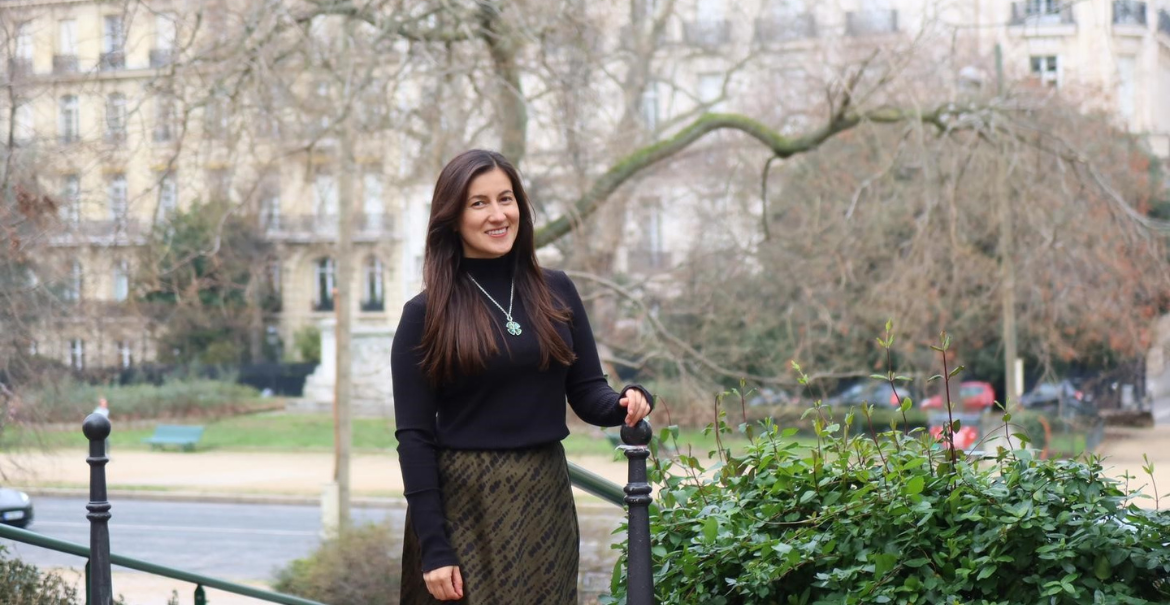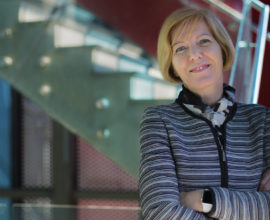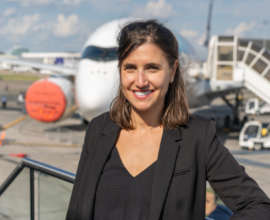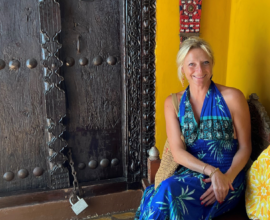Ana Maria Olaya Vargas
A priceless taste of freedom
![]() Reading Time: 10 minutes
Reading Time: 10 minutes
Vice President Strategy, Pricing & Interchange – Mastercard
As the Vice President of Strategy Pricing & Interchange at Mastercard, Ana Maria Olaya Vargas epitomises reasoned and modern-day feminism, inspired by the mixing of cultures. Her journey has taken her from Bogotá to Paris, and indeed Audencia, where she earned a master’s degree in International Management.
Her career path, spanning investment banking to financial analysis, is a masterclass in daring, determination, and resilience.
At just 33 years of age, Ana Maria has forged a career with her proven talent and a perfect knowledge of when to embrace new opportunities, whilst confronting her generation’s questions on the environment, motherhood, and inclusion, with no sense of fear nor taboo.
In her spare time, Ana Maria is a keynote speaker and an important contributor to Audencia’s Going France booklet, in which she shares her career path and provides some sound advice for our international students seeking to work in France. Her top tip: learn French just as soon as you can!
So, at what point did the young Colombian woman slip into the suit of a Parisian executive?
When I realised my childhood dream and acted on my longing to further my studies abroad. Hence, on arriving in France, at Audencia: this pushed me way out of my comfort zone.
Initially, my sights were firmly set on Australia but this proved to be too far away, quite expensive, and difficult to access. When I learned about the Master in International Management at Audencia, I realised how much of a remarkable opportunity this was: courses taught in English and set in this magnificent country of France.
It was a no-brainer so I made a start on the application process, whilst carrying on my mission as a Senior Financial and M&A Analyst at Incorbank. This is one of the peculiarities of the Colombian system: most students begin by finding employment after the first part of their university studies, then only pursuing a master’s degree three to four years down the line. This is also what I opted to do.
Thus, Audencia proved instrumental on my own journey, clearly for the quality of the training it delivered, and particularly for all I learned about myself during this time: agility, resilience, and the ability to adapt. It is worth pointing out that I was in no way prepared for all the complex administrative procedures when applying for overseas study. I also had quite a fright when my registration confirmation got lost in my spam folder!! Finding accommodation also turned into quite a minefield, as did my settling into an education system that was a far cry from my own.
All this is but a distant memory now. And yet, I’m sure that if I’m perfectly capable of operating with ease in a demanding international environment, like the one at Mastercard, then this is partly thanks to this experience. I have never been one for easy options. Nor have I allowed fear to dictate my decisions.
Your younger years in Colombia also seem to have greatly influenced your current professional outlook.
Yes, absolutely! I grew up in Bogotá, in a close-knit family with a sister who was sixteen months older than me. So close in age in fact, that we were often mistaken for twins. I had a strict education at a Catholic school for girls, so was taught a very contextual view on a woman’s place in society. A view that has clearly evolved with the experiences I’ve had over the course of my life, the different stages of my career and my encounters, with an ex-husband of Indian origin, for instance. However, this initial part of my life remains very present in terms of the choices I make today, all be it to shake things up a bit, at times.
Apart from these religious and cultural aspects, my education gave me a great deal of rigour and self-discipline. As a child, I was very diligent: this came at no personal cost, as I have always been fond of learning. Moreover, I learned English mostly by listening to American music in my room. Today, I still have a strong work ethic, which has stayed with me from this early period, as well as an almost innate ability to maintain close, interpersonal relationships. This comes in useful when moving in diverse corporate environments, in respecting and understanding cultural differences and, in a broader sense, remaining true to my own values.
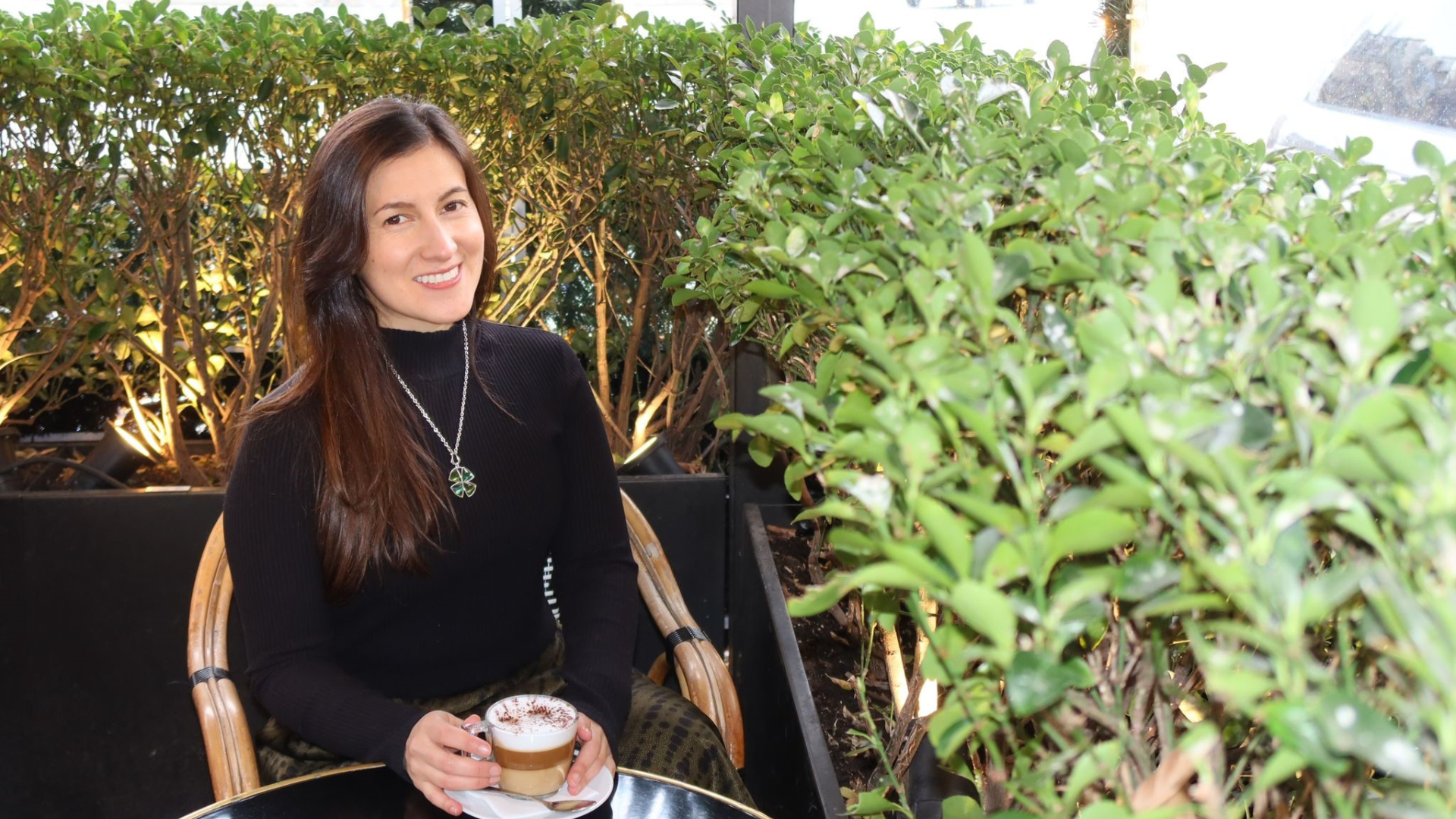
Coming to study in France was a bold move, would you say this proved the most daring of your entire career?
Daring or reckless? Whatever the case, I believe that the hardest decision was that of remaining in France at the end of my master’s degree, and once again after my internship at Euro Latina Finance.
Initially, I had only planned to come over for a year and my return ticket was ready for the month of July, when the course was due to end. It took me eight months to feel comfortable in France, and when I met my future husband, also a student at Audencia, I had no intention of staying and settling down in Paris. So, several weeks into the relationship, we broke it off and I returned to Colombia as planned. However, both of us were unhappy.
Therefore, I decided to leave things up to fate by searching for both a post in Colombia and an internship in Paris. In August, I met with the boss of Euro Latina Finance, who was looking to invest in my country. This set the wheels in motion: two weeks later, I began an M&A analyst internship for the Colombian market, based in Paris.
However, at the end of this internship, I declined their proposal to take charge of the new office in Medellin, preferring to stay in Paris. Even though this meant finding a job would prove hard, hence financial difficulties. We spent many long evenings eating frugally whilst watching Game of Thrones. And yet, I have no regrets, since this would eventually open the door to Mastercard.
How did you come to be recruited at Mastercard?
I must say it was all rather unexpected! I didn’t fit the profile they had drawn up for the post of financial analyst which I was applying for, as my experience lay solely in investment banking. I am like a great many women out there: if I don’t check off all the boxes of a job post, I tend not to go there. However, on this occasion I went for it because I was interested in the position – and since I was living a little on the edge financially. I banked on my transferable skills and this caught the attention of the recruiters.
Thus, I joined Mastercard, in Paris, back in June 2016, for a position as the Senior Financial Analyst, in charge of analysing financial data to support the strategic decisions for the French market. I learned a great deal over this two-year period, and compensated for my lack of experience by adopting a very proactive approach. I constantly endeavoured to go the extra mile, to take on new assignments, and delve deeper into each of the files. This attitude is the key to professional development, and hence climbing the corporate ladder.
This is how I came to get hired, but also how I managed to land my next job at Mastercard.
Just two years after getting hired, you went on to land the position of Finance Manager Europe at Mastercard. This is rapid career progression, wouldn’t you say?
Yes, especially for a young woman with no prior experience in financial analysis. But this takes us back to my point on the lessons I learned in my younger years: work hard, have self-belief, and seize opportunities. Also, that of overcoming any doubts you may have.
My advancement is down to this combination of factors, as well as having a proactive attitude that has allowed me to get myself “noticed” in the best sense of the term. When the Finance Manager for Western Europe had to take a few weeks’ leave due to personal reasons, I put myself forward to stand in for her and take on her responsibilities for a while, which proved a huge learning curve for me, but also a very enriching one. Then, when she decided not to resume her role, my familiarity with the post placed me as the natural choice of candidate for her succession. I was perceived as a committed employee, one always willing to go the extra mile: this is what fast-tracked me from a junior to a senior position in just a short period of time, serving to greatly increase my in-house visibility.
This visibility is essential to advancement for, when a position becomes available, you first need to be on their radar before you get to think about the job. This is the way things work. Yet, visibility is not just mere words, it is about hard graft and commitment. First and foremost, it is being great at your job.
Moreover, every one of my corporate promotions have operated in the exact same way. A company, even the largest, comprises its own small world: when you receive recognition for your professional qualities, the doors tend to open more easily.

In the space of just four years, you have gone from a junior position to being the Vice President Strategy, Pricing & Interchange for Europe. How was this achieved?
People often talk about opportunities they have been able to seize; however, I also like to underline the need to leverage these opportunities. Opportunities arise at the interchange of effort, results and daring. So, absolutely, you must deliver. You must perform. You must engage.
In 2019, one of my former managers got in touch to offer me a new assignment, what’s more at director level. However, the position was based in Brussels, at a time when teleworking had not yet become part of the business culture in large companies. As for me, I was in the process of applying for French citizenship so not looking to leave Paris. So, we negotiated and reached an agreement to divide my time equally between Paris and Brussels. I took up my position at the end of 2019 and two and a half months later, the pandemic forced everyone into working from home, permanently changing our outlook on remote work. Prior to COVID, I was shaking up the status quo; after, I was the new norm. In some ways, this is the very kind of daring I was alluding to earlier.
What was the time during the pandemic like for you in your new post?
My new role as the Vice President of Strategy, Pricing & Interchange for Europe wasn’t completely alien to the work I was doing prior to this. With an ever-greater strategic dimension, of course. I was already working for my own division partnering with different stakeholders across Europe to ensure our economic business model is adapted to the industry landscape and to our technological innovations.
During lockdown, I totally immersed myself in these new projects, with two key files providing me with a tremendous opportunity to gain experience and hone new skills. I have always carried out my duties in keeping with this rationale for personal and professional development, with the gaining of new know-how and know-how-to-be.
This is also the driving force behind my decision to make use of this period, whist not working away, to follow virtual people leader program offered by Mastercard. I saw myself continuing to move towards management. I have always considered myself lucky since the managers I’ve worked for have supported me in my career. Therefore, I would like to become a positive role model and give back.
All this paved the way for me taking up the position I now hold as the Vice President for Strategy Pricing & Interchange, as of September 2023. In this role, I work with an amazing team of regional directors. I also consolidate data and projects for the entire European area and serve as the point of contact between the regional level and the global level.
In what way has your international career helped influence your approach in terms of leadership and strategy?
I am the product of a very intimate mix of the culture where I grew up in Colombia, my everyday life in France today, my career working for an American company, the diverse range of teams, and the Indian influences from my ex-in-laws. This is a wonderful cocktail but isn’t always easy.
This journey has shown me the importance of empathy, communication and remaining flexible, while fostering an inclusive leadership style which values and takes advantages of our rich tapestry of differences. I believe effective management should extend beyond the common language we speak, namely English in my day-to-day work, to grasp and incorporate the cultural nuances affecting communication, thus collective performance.
The other vital part of my international career is this proactive spirit, acting as my continual inner compass and that, in my eyes, lies at the heart of corporate progression. As soon as I arrived in France, at Audencia, and even prior to this when getting into the school, I had to put up a fight, and come up with solutions to issues that I could so easily have avoided by remaining in my home country and embarking on a less daring path.
Then, once in the company, I continued in the same vein, building up a solid, professional network for myself thanks to the relations I managed to forge.
Ultimately, I am convinced that the globalised professional world we all move in today demands much more of us than mere strategy and managerial skills: it calls for an open, adaptable, and collaborative approach to work. Indeed, it seems to me that career paths which take on an international dimension very early on are more apt to develop this.
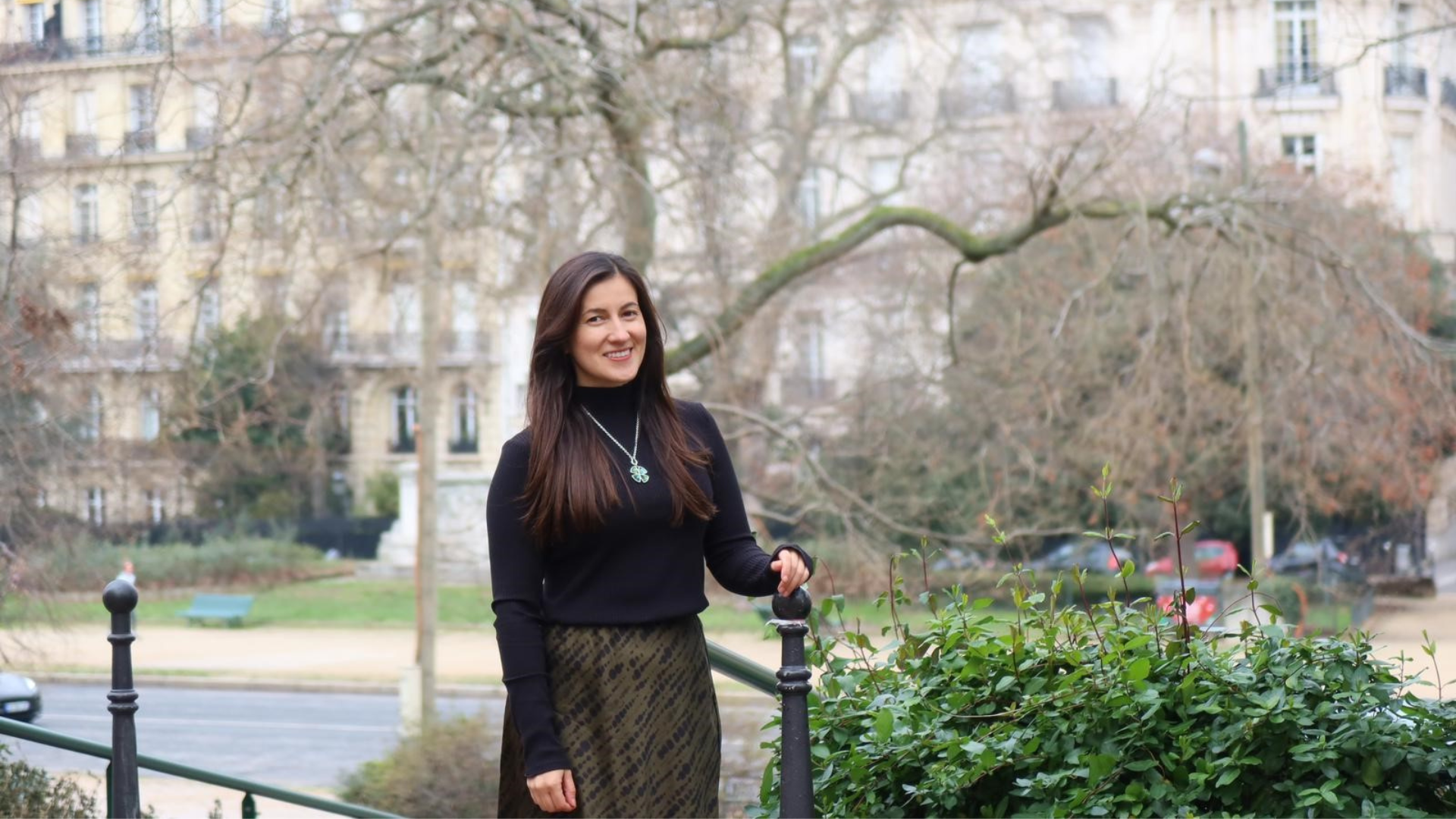
When faced with personal and professional challenges, how do you strike the right balance and manage to stay motivated?
I’ve come on in leaps and bounds over the past ten to fifteen years in this respect. Today, I have embraced more of a personal approach than I used to have in the past, when I would see my state of mind conditioned by the company’s expectations. The idea of becoming a mother, for instance, is no longer an easy choice in my mind, with respect to professional expectations but also in terms of my take on the world we live in, with all its human and environmental issues.
So, today, I find a balance through a certain form of emancipation from the social codes: I am a free, independent, serene woman. I do a lot of meditation and yoga, which helps me stay centred and able to manage everyday stress. I also place great importance on my passions, such as diving and travel, enabling me to recharge my batteries and maintain a positive outlook when obstacles hit. I am a great believer in the tremendous power of dreams and self-fulfilment. For me, happiness is not a destination but rather a way of life, that I endeavour to live to the full.
What advice would you give to students and recent graduates of Audencia eager to walk this same path?
I’m being unoriginal here, but to international students in particular, I would say: learn French! To work in France, even if English is your corporate language, French remains extremely important, especially if you are to develop a fulfilling social life. And I would advise everyone to open themselves up to international opportunities, as early as possible in your career, even if this pushes you out of your comfort zone. The network and the experiences you gain during these adventures are priceless. Stay curious, cultivate resilience when failure strikes, and never forget that each experience, good or bad, is a valuable lesson for the future.
What can we wish you for the future Ana Maria?
To continue forging my own singular, special path. No matter what lies ahead for me, so long as it is entirely my own. In turn, I also hope to be able to share my own story to inspire women especially, by talking about the challenges I have overcome. I hope to shine forth the strength I have drawn from these choices, particularly that of not having children, to inspire everyone to follow their own special path.
